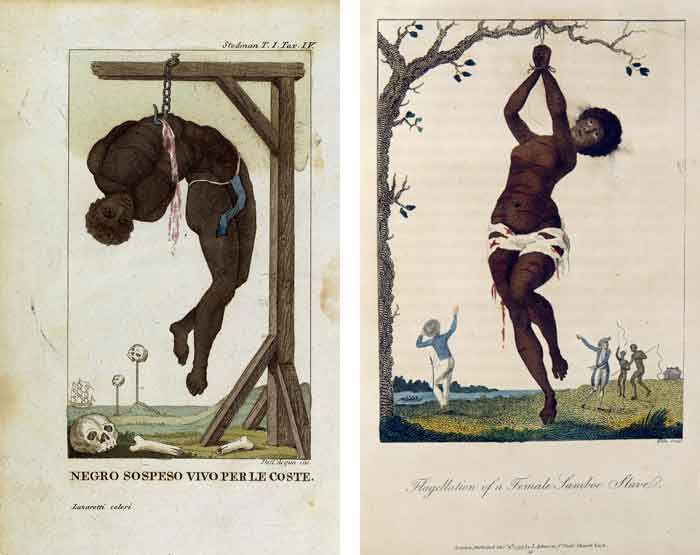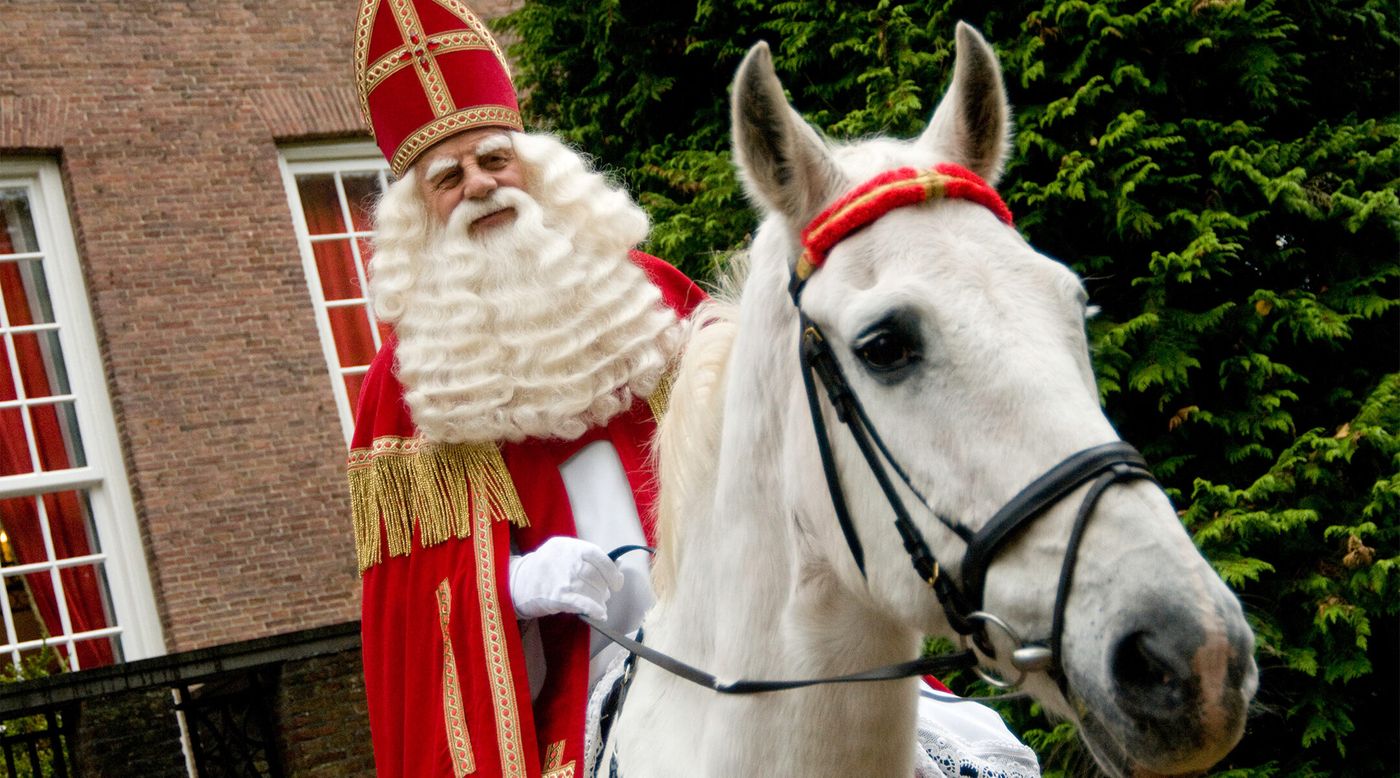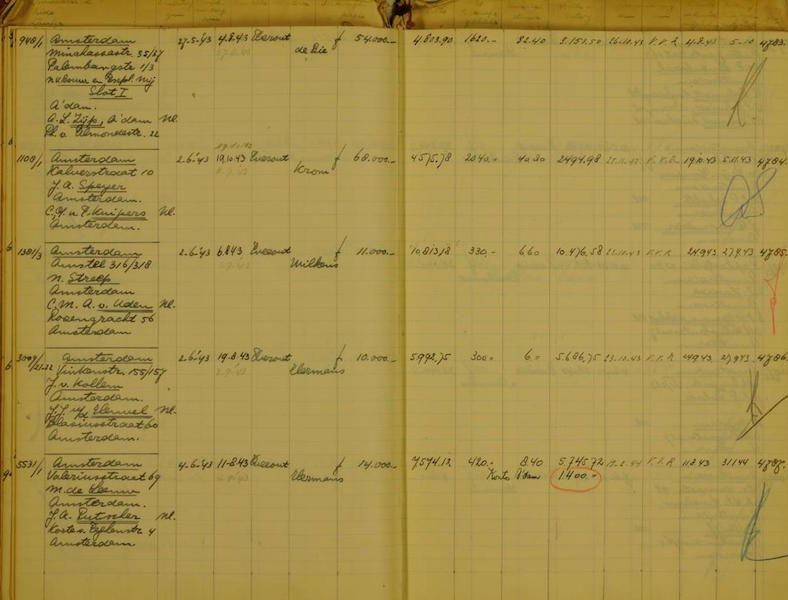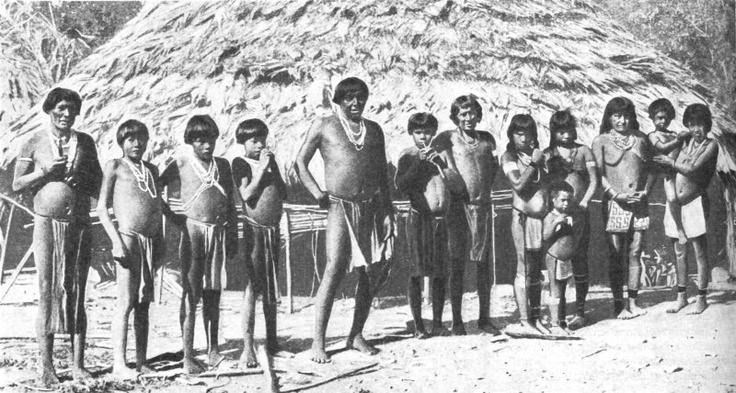Pandora's Archives III|Archives and a Sinful History
<br class="smart"> Introduction: Saint Nicholas and Black Peter Haitian Revolution and European Views of Slavery What can the National Archives do with regard to the collection of slave archives?
Will the good use of colonial archives have consequences? How to respond?
Appendix: Day o , Slave Song, World Famous Song

from the saint and his slave
Late November is probably the most exciting time of year for Dutch kids, because Sinterklaas is coming! Every year on the first Saturday after November 11, St. Nicholas will take his slave Zwarte Piet from Spain by steamboat. Every year, he will go ashore at a different Dutch town. Ride a white horse around the country, and finally put the gift in the shoes of the good boy on the evening of December 5th. The Dutch calendar marked this night as Pakjesavond ( Gift Night ).
Of course, the annual visit of St. Nicholas (the prototype of Santa Claus) is not really St. Nicholas, because that man died in AD 343. St. Nicholas of the modern Netherlands is played by a real person. Of course, he did not come from Spain on a steamboat, but the annual "visit" of St. Nicholas is indeed a national event. When St. Nicholas "arrives", there are TV media broadcast reports, adults and children are rushing.
But in recent years St. Nicholas has also appeared on another kind of news, but St. Nicholas is not the focus of the news, his slave Black Peter is.
⇩ The picture shows the actor Bram van der Vlugt , who played St. Nicholas on TV from 1986 to 2010, is a Dutch Holocaust survivor of World War II who has been Dutch Christmas for more than 20 years facade , Santa Claus in the hearts of children. He died of Wuhan pneumonia in the Netherlands on December 19 last year at the age of 86.

In the eyes of many Dutch people, a white man (who was also canonized as a saint by the church) brought black slaves to the cheers of adults and children. In the eyes of many Dutch people, this is not a review of the sinful history of slavery in the Netherlands, but only to perpetuate racial discrimination in the name of tradition. real behavior. In recent years, various reform proposals have emerged, some advocate "liberating" Black Peter, some advocate turning Black Peter white, some advocate making Black Peter ride a black horse to deliver gifts, St. Nicholas as Black Peter's slave, etc. etc., but considering how many people all over the Netherlands love the tradition of St. Nicholas-Black Peter, the reforms have become extremely difficult and predictably absolutely impossible to please everyone. But no matter how embarrassing, the topic is brought up every year in the late fall when the media reports that St. Nicholas is about to arrive on a steamship with Black Peter.
Facing the sinful past is not easy, and people who are willing to embark on the road of self-reflection and self-examination cannot struggle with their bare hands. They often have to turn to a special institution to find evidence and direction. That institution is the archives . In the past, the Netherlands made a fortune by enslaving others, and all the evidence of this slave history is kept by the National Archives, which also makes it difficult for the National Archives to stay out of contemporary self-examination. Below is an interview with our archivist on this topic.
Interviewee: Dhr. prof. dr. KJPFM(Charles) Jeurgens
Present|Strategic Consultant of the National Archives of the Netherlands, Professor of Archives at the University of Amsterdam Formerly served as Professor of Archives at the University of Leiden; Acting National Archivist of the Netherlands; Director of the Selection and Identification Department of the National Archives; Director of the Research Department of the National Archives

Now that the voices of Dutch society to reflect on colonial history and slave history are getting louder and louder, can you give a general explanation to readers in the Chinese-speaking world from the perspective of archival scholars?
Yan Plover: Let me give an example about colonization and slavery, which may be easier for people to understand. An example of this is the Haitian Revolution of 1791 . When the revolution broke out, Haiti was a French colony, and French slave owners built considerable wealth by importing a large number of African slaves and planting crops of high economic value such as tobacco, cotton, and coffee on the island. When the revolution broke out, there were about half a million black slaves on the island.
Please pay attention to this point in time - in 1791, two years before that (1789), the great revolution broke out in mainland France, the whole continent was in turmoil, and in a few years they would send the king and queen to the guillotine. The liar always thinks that others are lying to him, and the madmen of France, when they rebel against their aristocracy, doubt whether the slaves abroad will treat themselves in the same way. At that time, the Haitian colonists left black slaves with "no movement...don't even think about it", "we don't have to worry about the black slaves, they are very quiet and obedient", etc., and even mentioned that life on the island can be closed at night, because "the black slaves are freed It's just a fantasy."
It didn't take long for it to happen, and the Haitian Revolution was the most important slave revolutionary movement recognized by historians today. But if you look closely at the relevant historical materials, you will find that the French at the time dismissed this major revolution as a trivial matter. why? Because the "Black Revolution" was completely contrary to what they believed at the time. Europeans in that era were convinced that black people were not human beings, and had no ability to think or organize. How could they possibly coordinate and launch armed riots? The French were really unable to reconcile belief and fact, so they chose to believe it was a small thing, and we can see this in the historical documents.
⇩ Pictured is an engraving from The History of the Negro Empire in Haiti, published in London in 1805, entitled "The Negro Army in Retaliation for the Cruelty Inflicted on Them by the French ", depicting the end of the Revolution of 1804 of a massacre.

Yan Plover: Why talk about Haiti? First of all, because this is a stark example of archival research, you can see how big a gap exists between the records of the time and the reality. On the other hand, it was because the understatement of the French at that time completely exposed the horror of this slave system. Indeed, that was more than two centuries ago, and people at that time did not have the concept of human rights today, but this is not enough to absolve the colonists and slave owners. The extent to which one group (Europeans) trampled and enslaved another group (Africans) is clear from European history before and between the Haitian Revolution. Europeans at that time even thought that black people were incapable of thinking, could not understand the French Revolution, and certainly did not know how to imitate.
With that in mind, and looking at the African population of Dutch society from the former colonies, it's not hard to imagine how they felt about history and why the Netherlands as a society had to deal with that history.
㊟ The Dutch term for "society" is samenleving, which literally translates to "living together". Therefore, when speaking Dutch, you will feel more "common" in a society than when speaking in English or Chinese.
So what role do you think the National Archives should play in this?
Plover: The wealth of the Netherlands today is based on the fact that people enslaved others for two or three centuries, so it's a matter of everyone in the entire country sharing the wealth, and the evidence of that slave history is in the national archives. The problem now is that archives are not a very friendly place, usually only the archivists feel comfortable in the archives, and even the historians have to do a fair amount of homework before they can approach a particular archive. In other words, unless they were originally scholars in related fields, it would be difficult in reality for the descendants of the enslaved people to access and use these files, or at least face a considerable threshold. Say, "Let's go to some archival and history classes first!"
While I can't speak for the National Archives, and what I'm going to say next doesn't represent the official position of the National Archives -- that kind of stuff you'd ask the National Archives General -- but I think the National Archives should change the archives in addition to This daunting environment should also start to organize relevant archives. Who knows which piece of paper goes in which box better than the archivist? We archivists are as easy as reading a morning paper, but we should think from the perspective of non-professional users and imagine tools that are convenient for them to use. Of course, there are many possibilities here, and you can brainstorm ideas, but I think the National Archives should make a compilation similar to "Encountering Formosa" on the part of slave history (detailed betting), at least for the African-American population in need. It can be easier to find materials. Of course, such projects often require interested historians to join, but our society has never lacked historians anyway, and they are worried that they do not have files for them to make achievements.
㊟ Under the impetus of Leiden University history professor Bao Leshi (now retired), the Shunyi Museum of Taiwan Aboriginal Peoples has published five volumes of the Dutch-English compilation of Taiwan aboriginal historical materials " Encountering Formosa ". , which includes all the historical materials related to the aboriginal people in the Dutch East India Company archives of the National Archives in The Hague, and later published a Chinese translation in Taiwan. The arduous work of crawling and combing historical materials was independently completed by Yan Plushi and my mutual friend Faideli , which took more than ten years. Fedeli first transcribed the incomprehensible 17th century Dutch manuscript into modern Dutch alphabet, translated it into contemporary English, and then made bilingual review and correction by Prof. With Feideli's hard work first, Professor Kang Peide of Donghua University was able to quickly complete the Chinese translation without the labor of interpreting word by word. While many historical materials only extract the most relevant passages, readers can easily find complete documents in the archives by reading the file numbers of individual historical materials directly in the compilation.
But nine out of ten of the historical materials in the National Archives are left by slave-era Europeans with what now seem to be biased views, and will efforts to popularize these views contribute to the revival of colonial discourse? Do you really believe what the anthropologist Stolle said about reading along and against the archival grain?
Yan Plover: That's a good question, a very good question, the best question I've ever been asked in all of my interviews. Let's start with Stolle's point of view. I think her assertion of " reading between the textures of the archives " is interesting, and she also says reading against the textures of the archives. Can you read something outside the archive against the texture of the archive? I think so - but very limited. Realizing that there is something outside the archives is not the same as seeing clearly ideas and propositions that are different from the archives. When we read the archives of the colonists, we can at best be aware of the former, but not the latter. Take the Haitian Revolution as an example. You can read the French people's conscience and anxiety by reading the archives, which may prompt you to gain a deeper understanding of the Haitian slave society at that time, but you probably cannot read the views of the slave revolutionaries in the archives.
So, will the initiative of the National Archives to organize and provide archives from the era of slavery contribute to the revival of colonial discourse? That's very possible, because the movement of decolonization still encounters resistance from colonial mentality in every field , but we can't just give up the archives left in the colonial era because of this, at least the evidence of the crime of enslaving others is what our era needs. After sorting out, the descendants of the enslaved should also want to know how their ancestors were treated, where their hometown was before they were taken captive as slaves, and so on.
⇩ On August 17, 2020, the National Archives of the Netherlands published online the archives of the Curacao Slave Register and the Slave Emancipation Register . Curaçao was originally part of the Netherlands Antilles, but after 2010, it was transformed into a constituent country of the Kingdom of the Netherlands. The National Archives chose to open the archives on this day, which is the 225th anniversary of Curacao's black slave leader Tula leading the black slaves to rebel against the Dutch. On the same day, news from the Netherlands quoted the descendants of the victims: "I can finally know where they came from." Behind the calm speech is the bitterness and pain of many generations for more than two centuries.

Plover: Last summer the National Archives opened the Curacao Slave Register and the Emancipation Register , and the online database of the Suriname Slave Register has also been opened. This is just a starting point, the Dutch are not just taking people captive to the Netherlands Antilles and Suriname. In addition to slaves, the Dutch also did a lot of bad things in the East Indies, killing all the people of the entire island. These are all sinful histories that need to be reviewed, and the first step in the review is to make the historical materials public. We cannot stop using historical materials for fear of being misused.
㊟ The problems the Dutch faced in Suriname were not only the slave system of the year, but also the Arawak aborigines before the Dutch introduced black slaves. This is a people with a tragic fate. Since the time of the Spanish conquistadors in the sixteenth century, they have been plagued by plagues and wars. They have almost disappeared in the Caribbean Sea. Only a few thousand to ten thousand people have survived, some of whom live in Suriname today. ⇩ The picture shows an old photo of the Arawak people in the Caribbean , with their homes in the background.

Are there any measures to deal with possible negative effects?
Yan Lingshi: It's really, really difficult, and we're still groping in the field of archival science. First of all, in order not to let the historical material left by past colonists in written records become the mainstream of discourse, it is necessary to reduce the importance of these historical materials in the entire information pool. For example, to create some mechanism that allows the dead historical data to be dynamically linked to the living related community through information technology, in short, to maintain a close interaction with the community of slavery victims. I think this makes sense, after all they are the most immediate stakeholders.
In addition, as far as I know, enslaved people left a wealth of non-literal records, such as songs, dances, oral stories, and so on. These may not directly provide us with the fact that three plus two equals five, or ten minus ten equals zero - which may be found in the archives, but often on the opposite side of slaves - but can provide us with the fact that many archives Nothing. For example, descendants of the enslaved may all know what certain songs and dances mean, what emotions and oral stories of important events are associated with, and so on. Once we let these non-text and non-archival information become a larger information pool, the proportion and importance of archival historical materials will be relatively reduced, and it will be less likely to be regarded as the only opinion and voice. Of course, we may need to give society as a whole considerable time to learn a new way of understanding.
In addition to disclosing some of the slave-related files, does the National Archives have other actions? Can you get budget support in Congress?
Yan Plover: Hehe (dry laugh), as far as I know, there are currently no activities. As for the budget, no matter what you try, there is a crowding out effect. If the budget of the National Archives is increased, the budgets of other agencies will be crowded out. If the budget of the National Archives is not increased, the existing work plans will be crowded out from the existing budget. In short, this is a big problem and needs to be made by the private sector. A lot of effort. As long as there is a certain consensus in society, the Congress and the government cannot but follow, and consensus is discussed, and consensus will never be reached without discussion. Social communication in the Netherlands is notoriously inefficient. No matter how big or small it is, it will take more than ten years, but as long as a consensus is reached, it is usually a fairly stable consensus. I think this kind of sacrifice efficiency for effectiveness . The method is still not bad.
㊟ In the past, the official name of the Netherlands National Archives was Rijksarchief, which can be translated into English State Archive. Later, in 2002, it was renamed Nationaal Archief, which is equivalent to the English National Archive, although the Chinese translations of both are National Archives. Yan Lingshi believes that since it has changed its name and claims to be the archives of the whole people , it can no longer hold the thinking of the national archives and only serve the interests and convenience of the country. He even thought that if the National Archives never wanted to change, it should change its name back and be the watchdog of the country.
Finally, back to the topic of St. Nicholas and Black Peter, what do you think we should do?
Yan Plover: Yes, what should I do? I do not know either. But at least one thing I know is that our feelings for tradition cannot be used as a reason to continue hurting the feelings of others. Opponents of reforming the traditions of St. Nicholas and Black Peter are arguing for nothing more than a cultural sentiment that should not be harmed. But every kid at some point finds out that St. Nicholas and Black Peter aren't real, and that hurts a bit, doesn't it? I still remember to this day, when I was a child, I first found out that St. Nicholas was not real, and then I found out that the Easter Bunny was not real, and one day I suddenly realized, "Isn't Jesus Christ real?" Even so Shocked, I'm still alive today, so I don't see how much everyone can suffer by liberating Black Peter and letting St. Nicholas sing his own one-man show. If the final consensus is so, at least I will gladly accept it.
Addendum: Jamaican Banana Boat Folk Song "Day o"
Yan Plover talked about the enslaved people's song and dance stories and other creations, which are passed down from ear to ear through the Internet, which are an integral part of our understanding of the colonial and slave era. The Jamaican banana boat folk song "Day O" is a famous example. It was originally a slave song, and later became famous all over the world by the singing of the black Jamaican singer Bella Fonte . This song has also become Bella Fonte's most well-known. representative work. Some people say that most singers are often bored with famous works and just have to sing them repeatedly on the stage, but Bellafonte seems to still love this song from the bottom of his heart after decades, perhaps partly because this song represents his origin and even one. the history of the entire group. He repeatedly sang "It's dawn, I want to go home" with a brisk tune, perhaps also telling them that they still have a desire to reach the other side.
Come, mister tally man, tally me banana
Daylight come and me wan' go home
Preview of the next issue <br class="smart">Pandora's Archives IV How did the Dutch National Archives contribute to the study of early Taiwan history? Can the history of Taiwan based on colonial archives decolonize?
Like my work? Don't forget to support and clap, let me know that you are with me on the road of creation. Keep this enthusiasm together!















- Author
- More